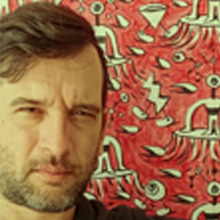Hoy, celebrando el 10° Aniversario de humorsapiens.com hemos invitado a este vis a vis a un humorista gráfico cubano-chileno, el buen amigo Alen Lauzán. Para los que no lo conozcan -según la información que tengo-, ha realizado como mínimo 30 exposiciones de sus obras. Ha obtenido premios y menciones internacionales y todos los reconocimientos (o casi todos, para no ser absolutista), que se otorgan en Cuba. Esto último es bien decidor, debido a la alta calidad de los humoristas gráficos en la Isla. Y por si fuera poco, ha publicado varios libros de humor gráfico, ilustración infantil e historietas. Y sus dibujos han sido distribuidos por Caglecartoons (USA) y Cartonclub (México) y publicados en diarios y revistas de Europa, Estados Unidos y América del Sur.
Termino esta presentación “oficial”, mencionando que ha colaborado y colabora desde 1994 hasta la actualidad, en Cuba (en el deteté y unas cuantas publicaciones más) y en otros países como México, Perú, Estados Unidos, Francia, España, Argentina, incluyendo Chile, donde ha hecho una exitosa carrera.
PP: Mi querido amigo Lauzán. Ante todo, decirte que es un placerazo realizar este vis a vis contigo. Y lamento que viviendo ambos en Chile nos veamos tan poco por la vida que llevamos, que poco tiempo nos brinda para socializar como quisiéramos. Por lo menos es mi caso.
LAUZÁN: El placer es mío, la verdad. Nos hemos visto poco, es cierto, sobre todo porque después de 14 años de vivir en Santiago de Chile me mudé a la ciudad de Talca hace diez, ¡los mismos que cumple Humor Sapiens!
PP: Lo curioso es que he ido cien veces a Talca, visitando escuelas con mis libros infantiles y dando charlas y no sabía que podía ir a tu casa a tomar café (o ron). Bueno, entrando en materia, ¿cómo ha sido la evolución de tu obra, en cuanto a forma y contenido, desde que te iniciaste hasta ahora?
LAUZÁN: La evolución es algo que no para, diría que ni pienso en eso, pero ya que preguntas siento que no alcanzo a evolucionar aún del todo… Bueno, el día que sienta eso paro y me dedico a otra cosa. Ha sido una evolución a la par de mis propias vivencias y experiencias, desafíos y retos laborales inesperados.
PP: Es cierto. Si uno se queda pegado y no evoluciona, muere. Dime una cosa: ¿te gusta que le hagan entrevistas?
LAUZÁN: No me gustan mucho pero... esta la haces tú. ¡Y porque eres de Matanzas!
PP: Gracias, amigo mío. Pues voy de lleno a la yugular... Por lo que he visto, a ti te gusta más la caricatura política que la de humor general, ¿no es así?
LAUZÁN: Hoy me cuadra mucho más el humor de actualidad, la sátira política. Aunque me encanta el humor general o blanco, según le digan, lo sigo realizando cuando la política me lo permite o cuando deseo participar en Salones de Humor Gráfico. Pasa que la sátira política me mantiene dibujando cada día, interpretando sucesos puntuales, graficando personajes de ocasión y jodiendo que al final se trata de eso. Creo que los dibujos que te enviaré para ilustrar esta entrevista estarán en esa cuerda de humor general.
PP: Sí, me encantaron esos dibujos. Pero en tus obras, sean de humor general o de humor político, lo que se nota es que te estás divirtiendo siempre. Y es lógico, porque como persona eres un gran jodedor, lo sabemos, ja, ja… Amigo mío, dime una cosa: ¿quiénes son tus referentes, tus ídolos -fallecidos o no-, dentro del humor gráfico?
LAUZÁN: He tenido muchos y tiene que ver con esa misma evolución de la que hablaba. Los animados polacos, checos, soviéticos, el humor que llegaba en las revistas de esos países, todo dedeté. Más tarde Topor, Searle, Sempé, el cubano Prohías, Fontanarrosa, Langer… por mencionarte algunos. Todos me han moldeado el trazo, la forma de plantear un tema, la composición, el remate del chiste, cómo tratar una noticia, representar una idea… Todo eso ha evolucionado gracias al descubrimiento de cada uno de esos referentes.
PP: Coincido con muchos de los que mencionas. La gente del dedeté, Prohías y Fontanarrosa están entre mis favoritos. Ahora, dime también, ¿cuáles son los límites del humor para ti? Si crees que existen, por supuesto.
LAUZÁN: Los límites existen pero no debían, pero ya que están creo que siempre habrá formas de romperlos, creo que los límites se los pone cada cual. Mira, no tengo límites, más bien tengo temas que me interesan o inspiran más que otros. Hay temas que me importan un comino pero son inspiradores, otros que adoro y apoyo pero no me dan para tratarlos.
PP: Es verdad. Muchos límites los pone uno; sin embargo, creo que hay algunos, como los que ponen lo gobiernos totalitarios, las dictaduras, o los intereses de los dueños de los medios, por ponerte algunos ejemplos, que no dependen de uno. Esos son los que dices tú que no deberían existir. Oye, en tu caso, ¿Has recibido algún tipo de censura en tu trabajo en Cuba o en cualquier otro país? ¿Puedes contarnos?
LAUZÁN: No recuerdo un caso de censura explícita en Cuba, porque era perder el tiempo ir contra lo que estaba establecido, las veces que publiqué Opinión Gráfica ya venía el tema y sabía que el dibujo tenía que entrar por el aro. En Chile, acostumbrados en una publicación a hacer chistes sobre la virgen, cuando empezó a entrar publicidad nunca más pudimos meternos con ella porque los auspiciadores eran católicos, “el que paga manda”. Pero no sé hasta qué punto eso es censura. Censura he sufrido en la Redes Sociales, con dibujos que se mal interpretan sobre todo. No me preocupa la censura, es parte del juego humorístico, de ahí nace como género. Siempre pongo que soy “responsable de mis dibujos, usted de lo que interprete”.
PP: Buena y real filosofía. Claro, tampoco nos debe preocupar las cloacas de las redes sociales. Y la ignorancia. También facilita esas mal interpretaciones. Así como las inclinaciones políticas. A propósito, ¿para ti el humor es de izquierda, de derecha o de ninguno de los dos sectores?
LAUZÁN: El humor es humano y como tal puede ser lo que le de la gana, política y moralmente hablando. Prefiero el humor que satiriza cualquier sector, en mi opinión ese es el mejor humor y por tanto los mejores humoristas.
PP: Obviamente, la razón del humor es ir contra los abusos y errores de las autoridades, sean del signo político e ideológico que sean. Y una pregunta que siempre le hago a los humoristas políticos: ¿el humor puede derribar gobierno? Si crees que no, ¿por qué se hace sátira contra los gobiernos?
LAUZÁN: Chico, hasta donde sé, no ha caído ningún totalitarismo y/o autoritarismo a base de humor pero sé que la sátira política influye muchísimo en el miedo que inculcan. Lo desarma, desenmascara. Un dibujo, una obra teatral, libro humorístico o chiste de boca en boca e incluso hoy un meme, puede hacer que mucha gente reflexione y hasta pierda el miedo al poder. Ya eso es un gran aporte para derribar cualquier dictadura o empuje para cambiar democráticas meteduras de patas.
PP: Excelente respuesta. Pienso igual. Y en tu caso, Lauzán, ¿cómo ha sido tu vida profesional en Chile, sobre todo con el mundo de izquierda que tanto abunda en nuestro medio, sabiendo que eres un disidente cubano? Ya sabes, muchos nos califican de derecha (sin saber cómo pensamos), solo porque nos fuimos de Cuba.
LAUZÁN: Cuando llegué a Chile recibí el valioso apoyo del humorista gráfico Guillo (Guillermo Bastías). Él me presentó en los medios, en las agencias de publicidad y diseño. Para eso él me armó antes dos catálogos, curriculum con el material que traía desde Cuba, uno para medios de izquierda y otro para la derecha. Así logré publicar tanto en El Mercurio como en Rocinante, en La Tercera como en The Clinic y trabajar para agencias de diseño de ambas orillas. Claro, me encantó The Clinic porque tenía más que ver con lo que me hubiera gustado hacer en Cuba y cuando empezaron a tomar vuelo mis dibujos ahí, los medios de derecha me desecharon pero igual me siguieron llamando para proyectos de centro derecha o centro izquierda. En los años que trabajé en The clinic me encontraba gente de ultra izquierda que decía que ese periodicucho en el fondo era de derecha y derechistas que lo encontraban comunista. Eso me parecía genial, como mis dos curriculum.
PP: Ja, ja. Así es. Los extremos son así. Oye, mencionaste que Guillo te ayudó y de manera inteligente. Pues te digo que me encanta su obra y hace poco tuve el honor de ser miembro del jurado que le otorgó el Premio Nacional de Humor, Chile 2023, así que cuando lo veas, salúdalo de mi parte. Bueno, ¿en qué proyecto estás involucrado ahora?
LAUZÁN: Estoy enfrascado en MAZZANTINI (revistamazzantini.com) una revista de toros, chivas y tarruces, de cepa y de cruce. Sátira gráfica sobre política cubana, un proyecto que se armó hace par de años atrás pero que hace tres meses y gracias a la Fundation for Human Rights in Cuba (fhrcuba.org) se materializó. Cada día de la semana se realizan dos o tres dibujos, memes o titulares humorísticos sobre la realidad cubana en las redes sociales de MAZZANTINI y al cerrar la semana diseño con ese contenido una edición. Para cuando salga esta entrevista ya debe ir por el número 10. La idea es dejar registrado, gráfica y humorísticamente los sucesos de cada semana cubana. Le veo mucho valor al humor gráfico a la hora de registrar el presente inmediato, a futuro es la mejor forma de entender el pasado.
PP: He visto algunos números. Te felicito. Y felicita a Garrincha que está contigo en ese proyecto. Oye, y para relajar un poco este vis a vis, ¿puedes contarme una anécdota graciosa, curiosa, simpática y/o ingeniosa que hayas vivido en tu carrera en el humor?
LAUZÁN: Tengo dos que me parecen notables. En Cuba, siendo muy joven (entre 19 y 24 años) trabajé en dedeté junto a Tomy, con quien aprendí mucho, él se va a diseñar otra revista y quedé solo dibujando y editando. Manuel, tu vecino, llegaba desde Matanzas en su Fiat Polski a entregar dibujos. Algunos los entintaba en carretera (manejaba el hijo) y se notaba el vaivén, otras no alcanzaba, me los daba boceteados y ¡me pedía entintarlos! Tiempo después Enrique Núñez Rodríguez editó un libro de los dibujos noventeros de Manuel, (“El otro libro de Manuel”) y me pidió los originales que estaban en Dedeté. Yo tenía separados esos que entinté y me pregunta sobre ellos, le expliqué, los ve y me dice “si no decimos, nadie lo notará”. Un honor entintar a lo Manuel.
PP: Claro que es un honor. Mi coterráneo Manuel es grande entre los grandes. Hace un par de Boletines atrás lo entrevisté. ¿Y la otra anécdota?
LAUZÁN: La otra anécdota ocurre en Chile, trabajé diez años en la revista The Clinic y los días de cierre e imprenta volvía a casa de madrugada. Tomé un taxi y el chofer tenía un ejemplar de la semana anterior, le pregunté si le gustaba y le conté que yo trabajaba en esa publicación. “A mi hijo lo que más le gusta son los dibujos de Lauzán”, dijo. Quedé mudo. Yo andaba con un ejemplar acabado de salir de imprenta, fresquito, que salía a la calle al día siguiente y se lo regalé, no lo podía creer, tampoco yo tanta casualidad. Al final le dije que yo era Lauzán y hasta me pidió ver el carnet de identidad, corrobora que soy yo y me hace firmar, para su hijo, sobre un dibujo mío en el ejemplar que le pasé. Muy loco todo, pero más loco quedé cuando no me cobró el viaje.
PP: Yo tú andaría con un ejemplar de The Clinic siempre, cada vez que tuviera que tomar un taxi. Te ahorrarías mucha plata. No, en serio. Linda anécdota. Muchas veces los humoristas gráficos no tienen la posibilidad de estar “en vivo” con su público y cuando eso pasa me imagino que deben sentir una ola de orgullo y alegría, como en tu caso. Ya ves, eres muy conocido en Chile… Hermano, ¿qué pregunta te hubiera gustado que te hubiese hecho en este vis a vis que no te hice? ¿Podrías responderla ahora?
LAUZÁN: Me hubiera gustado una pregunta sobre la Inteligencia Artificial, ¿viste que está de moda? Tanto las AI como las preguntas sobre el tema. Pero no te la hubiera respondido, porque me importa un comino todo lo que se llame “artificial” y que se crean inteligentes los que responden tales interrogantes.
PP: Ya verán nuestros humornautas tus caricaturas a en esta entrevista, donde te divertiste sobre ese tema. Bueno, para cerrar, ¿qué le dirías a nuestros seguidores de humorspaiens.com?
LAUZÁN: Que como yo, hacen muy bien en seguirles, ¡Los homos mueren, el Humor Sapiens es inmortal!
PP: Me recordaste una vieja consigna. Bueno, hermano mío, te doy millones de gracias por tu tiempo y tu buena disposición. Y claro, te deseo mucha salud y que sigas con tus éxitos. Un abrazo grande.
LAUZÁN: ¡Lo mismo! Espero otra entrevista cuando cumplan 20 años. Veámonos antes, eso sí.
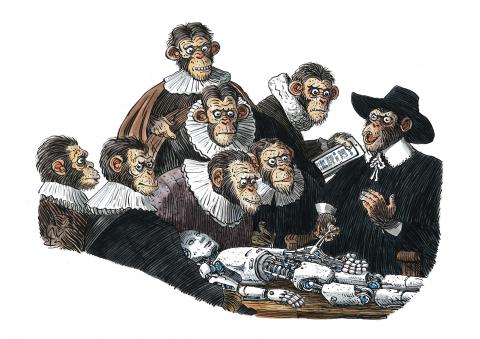
Alen Lauzán
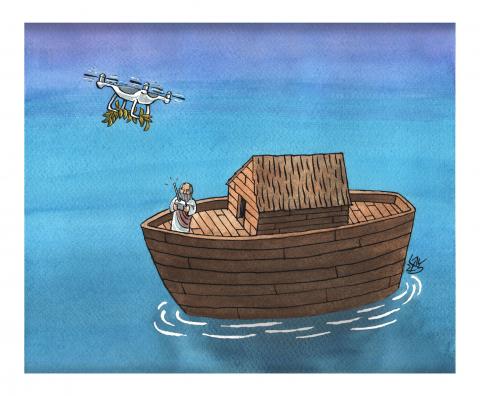
Alen Lauzán
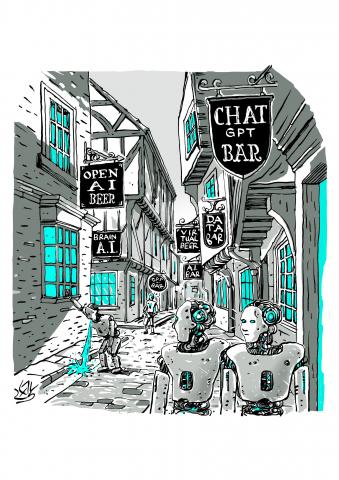
Alen Lauzán
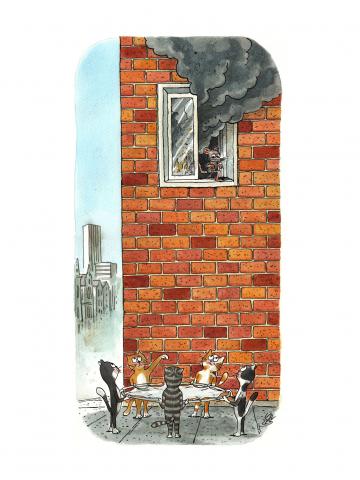
Alen Lauzán
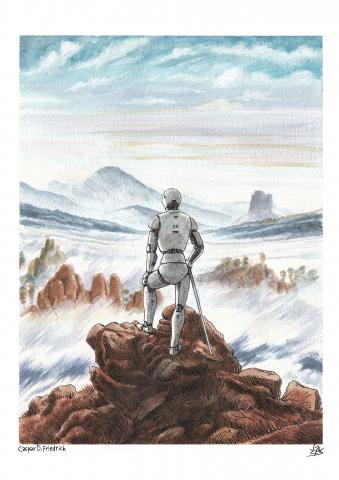
Alen Lauzán
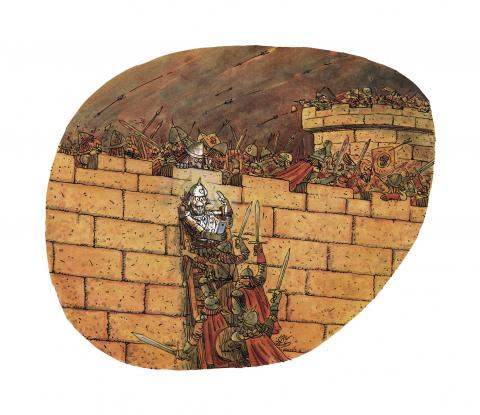
Alen Lauzán
Interview with Alen Lauzán
By Pepe Pelayo
I'm not worried about censorship, it's part of the humorous gam
Today, celebrating the 10th Anniversary of humorsapiens.com, we have invited a Cuban-Chilean cartoonist, our good friend Alen Lauzán, to “dialogue” with us.
For those who don't know him - according to the information I have - he has held at least 30 exhibitions of his works. He has obtained international awards and mentions and all the recognitions (or almost all, so as not to be absolutist), that are granted in Cuba. The latter is decisive, due to the high quality of graphic comedians on the Island. And if that were not enough, he has published several books of graphic humor, children's illustration and comics. And his drawings have been distributed by Caglecartoons (USA) and Cartonclub (Mexico) and published in newspapers and magazines in Europe, the United States and South America.
I finish this “official” presentation, mentioning that he has collaborated and collaborates from 1994 to the present, in Cuba (in Deteté and a few other publications) and in other countries such as Mexico, Peru, the United States, France, Spain, Argentina, including Chile, where he has had a successful career.
PP: My dear friend Lauzán. First of all, I want to tell you that it is a great pleasure to have this “dialogue” with you. And I regret that while we both live in Chile we see each other so little because of the life we lead, which gives us little time to socialize as we would like. At least that's my case.
LAUZÁN: The pleasure is mine, really. We have seen little of each other, it is true, especially because after 14 years of living in Santiago de Chile I moved to the city of Talca ten years ago, the same number as Homo Sapiens!
PP: The funny thing is that I have been to Talca a hundred times, visiting schools with my children's books and giving talks and I didn't know I could go to your house to drink coffee (or rum). Well, getting into the subject, how has the evolution of your work been, in terms of form and content, since you started until now?
LAUZÁN: Evolution is something that doesn't stop, I would say that I don't even think about it, but since you asked, I feel like I haven't managed to fully evolve yet... Well, the day I feel that way, I'll stop and dedicate myself to something else. It has been an evolution along with my own experiences, challenges and unexpected work challenges.
PP: It's true. If you stay stuck and don't evolve, you die. Hey, from what I've seen, you like political cartoons more than general humor ones, right?
LAUZÁN: Today, current humor and political satire suit me much more. Although I love general or white humor, depending on what they say, I still do it when politics allows it or when I want to participate in Graphic Humor Salons. It happens that political satire keeps me drawing every day, interpreting specific events, graphing occasional characters and joking that in the end it's about that. I think that the drawings that I will send you to illustrate this interview will be in that vein of general humor.
PP: Yes, I loved those drawings. But in your works, whether general humor or political humor, what is evident is that you are always having fun. And it is logical, because as a person you are a great screwer, we know it, ha, ha... My friend, tell me something: who are your references, your idols -deceased or not-, within graphic humor?
LAUZÁN: I have had many and it has to do with that same evolution that I was talking about. The animated Poles, Czechs, Soviets, the humor that came in the magazines of those countries, all of Dedeté. Later, Topor, Searle, Sempé, the Cuban Prohías, Fontanarrosa, Langer... to name a few. They have all shaped my lines, the way of presenting a topic, the composition, the punch line of the joke, how to deal with news, represent an idea... All of this has evolved thanks to the discovery of each of these references.
PP: I agree with many of what you mention. The people of Dedeté, Prohías and Fontanarrosa are among my favorites. Now, also tell me, what are the limits of humor for you? If you believe they exist, of course.
LAUZÁN: Limits exist but they shouldn't, but since they exist, I think there will always be ways to break them, I think everyone sets limits for themselves. Look, I have no limits, rather I have topics that interest or inspire me more than others. There are topics that I don't give a damn about but are inspiring, others that I love and support but I don't have the time to deal with them.
PP: It's true. One sets many limits; However, I believe that there are some, such as those put forward by authoritarian governments, dictatorships or interests of media owners, to give you some examples, that do not depend on you. Those are the ones that you say should not exist. Hey, in your case, have you received any type of censorship in your work in Cuba or in any other country? Can you tell us?
LAUZÁN: I don't remember a case of explicit censorship in Cuba, because it was a waste of time to go against what was established, the times I published Opinion Gráfica the issue was already coming up and I knew that the drawing had to fit through the hoop. In Chile, we were accustomed in a publication to making jokes about the Virgin, when advertising began to appear we could never get involved with it again because the sponsors were Catholic, “he who pays is king.” But I don't know to what extent that is censorship. I have suffered censorship on Social Networks, with drawings that are misinterpreted above all. I'm not worried about censorship, it's part of the humorous game, that's where it was born as a genre. I always say that I am “responsible for my drawings, you for what you interpret.”
PP: Good and real philosophy. Of course, we shouldn't worry about the sewers of social networks either. And ignorance. It also facilitates those misunderstandings. As well as political inclinations. By the way, for you is humor from the left, from the right or from neither of the two sectors?
LAUZÁN: Humor is human and as such it can be whatever it wants, politically and morally speaking. I prefer humor that satirizes any sector, in my opinion that is the best humor and therefore the best comedians.
PP: Obviously, the reason for humor is to go against the abuses and errors of authority, regardless of their political or ideological nature. And a question I always ask cartoonists: can humor overthrow the government? If you think not, why is satire against governments?
LAUZÁN: Boy, as far as I know, no totalitarianism and/or authoritarianism has fallen based on humor, but I know that political satire greatly influences the fear they instill. He disarms it, unmasks it. A drawing, a play, a humorous book or a word-of-mouth joke, and even today a meme, can make many people reflect and even lose their fear of power. That is already a great contribution to overthrow any dictatorship or push to change democratic blunders.
PP: Excellent answer. I think the same. And in your case, Lauzán, how has your professional life been in Chile, especially with the leftist world that abounds so much in our environment, knowing that you are a Cuban dissident? You know, many call us right-wing (without knowing how we think), just because we left Cuba.
LAUZÁN: When I arrived in Chile I received the valuable support of the graphic humorist Guillo (Guillermo Bastías). He introduced me to the media, to advertising and design agencies. For that, he put together two catalogs and a curriculum for me with the material he brought from Cuba, one for left-wing media and the other for the right. This is how I managed to publish in both El Mercurio and Rocinante, in La Tercera and The Clinic and work for design agencies on both shores. Of course, I loved The Clinic because it had more to do with what I would have liked to do in Cuba and when my drawings began to take off there, the right-wing media dismissed me but they still kept calling me for center-right or center-left projects. In the years that I worked at The Clinic I met people from the ultra-left who said that the newspaper was basically right-wing and right-wing people who found it communist. That seemed great to me, like my two resumes.
PP: Ha ha. That's how it is. The extremes are like that. Hey, you mentioned that Guillo helped you and smartly. Well, I tell you that I love his work and I recently had the honor of being a member of the jury that awarded him the National Humor Prize, Chile 2023, so when you see him, say hello to him for me. Well, what project are you involved in now?
LAUZÁN: I am immersed in MAZZANTINI (revistamazzantini.com), a magazine about bulls, chivas and tarruces, strains and crossbreeds. Graphic satire on Cuban politics, a project that was put together a couple of years ago but that three months ago and thanks to the Foundation for Human Rights in Cuba (fhrcuba.org) materialized. Every day of the week, two or three drawings, memes or humorous headlines about the Cuban reality are made on MAZZANTINI's social networks and at the end of the week I design an edition with that content. By the time this interview comes out, it should already be at number 10. The idea is to record, graphically and humorously, the events of each Cuban week. I see a lot of value in graphic humor when it comes to recording the immediate present, in the future it is the best way to understand the past.
PP: I've seen some numbers. Congratulations. And congratulate Garrincha who is with you on that project. Hey, and to relax this “dialogue” a little, can you tell me a funny, curious, friendly and/or witty anecdote that you have experienced in your career in humor?
LAUZÁN: I have two that seem notable to me. In Cuba, when I was very young (between 19 and 24 years old) I worked at Dedeté alongside Tomy, with whom I learned a lot. He went to design another magazine and I was left alone drawing and editing. Manuel, your neighbor, arrived from Matanzas in his Fiat Polski to deliver drawings. Some he inked on the road (the son drove) and the back and forth was noticeable, others he couldn't reach, he gave them sketches to me and asked me to ink them! Some time later Enrique Núñez Rodríguez edited a book of Manuel's nineties drawings, (“Manuel's other book”) and asked me for the originals that were in Dedeté. I had those separated that I inked and he asks me about them, I explained to him, he sees them and tells me “if we don't tell, no one will notice.” An honor to ink like Manuel.
PP: Of course it is an honor. My countryman Manuel is great among the greats. A couple of Bulletins ago I interviewed him. And the other anecdote?
LAUZÁN: The other anecdote occurs in Chile, I worked for ten years at The Clinic magazine and on the days of closure and printing I returned home at dawn. I took a taxi and the driver had a copy from the previous week, I asked him if he liked it and I told him that I worked for that publication. “What my son likes most are Lauzán's drawings,” he said. I was speechless. I was carrying a copy fresh off the press, fresh, that went out the next day and I gave it to him, I couldn't believe it, neither could I, such a coincidence. In the end I told him that I was Lauzán and he even asked to see my identity card, he confirmed that it was me and made me sign, for his son, a drawing of mine in the copy that I gave him. Everything was very crazy, but I was even crazier when he didn't charge me for the trip.
PP: I would always carry a copy of The Clinic, every time I had to take a taxi. You would save a lot of money. Not seriously. Nice anecdote. Many times cartoonists do not have the possibility of being “live” with their audience and when that happens I imagine they must feel a wave of pride and joy, as in your case. You see, you are very well known in Chile… Brother, what question would you have liked me to have asked you in this “dialogue” that I did not ask you? Could you answer it now?
LAUZÁN: I would have liked a question about Artificial Intelligence, have you seen that it is fashionable? Both the AIs and the questions on the topic. But I wouldn't have answered it, because I don't give a damn about anything that is called "artificial" and that those who answer such questions think they are intelligent.
PP: Our humorists will see your cartoons in this interview, where you had fun on that topic. Well, to close, what would you say to our humorspaiens.com followers?
LAUZÁN: Like me, they do very well in following them. Homosexuals die, Humor Sapiens is immortal!
PP: You reminded me of an old slogan. Well, my brother, I thank you millions for your time and your good disposition. And of course, I wish you good health and continued success. A big hug.
LAUZÁN: Same thing! I hope for another interview when they turn 20. Let's see each other first, yes.
(This text has been translated into English by Google Translate)

